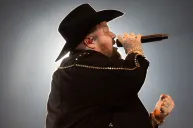In many ways, Jelly Roll's run-ins with the law between ages 14 and 24 have helped his career. Without them, you lose an integral part of his unlikely success story and a recurring reference point for his rawest and most vulnerable songs.
Yet, as he told "CBS Sunday Mornings," the lingering circumstances of his past continue to limit his seemingly boundless career.
"This felony carries with me," the singer-songwriter said. "It's sad. It prohibits me from a lot... I finally got a passport. I was so excited that America was willing to let me leave, and I didn't realize other countries had to let me come. That's my new hurdle. We had a No. 1 in Australia for three weeks this year. We could probably go to Australia and do arenas, and I'm not able to go right now. We could probably go to the arenas, and I can't go. We could probably go to Canada and do arenas, but they won't let me come. So it's so funny that here I am becoming a global artist, and I'm restricted still to my own yard."
That quote comes from the recent "CBS Sunday Mornings" segment during which correspondent Kelefa Sanneh took Jelly Roll back to the "Save Me" singer's former cell at Nashville's Metro-Davidson County Detention Facility.
The broadcast followed a huge year for Jelly Roll. Aside from those Grammy nods, the singer-songwriter earned critical acclaim and commercial success with his Whitsitt Chapel album and won the CMA's New Artist of the Year award. Each accomplishment well exceeded Jelly Roll's post-jail expectations.
"Even when I left here, I didn't have a plan," he said. "I knew that I loved music, and I knew it was the only thing I had any skill set [for]."
Jelly Roll is up for Best New Artist and Best Country Group/Duo Performance —along with Lainey Wilson for their duet "Save Me"— at this year's Grammys, which air on Feb. 4.




